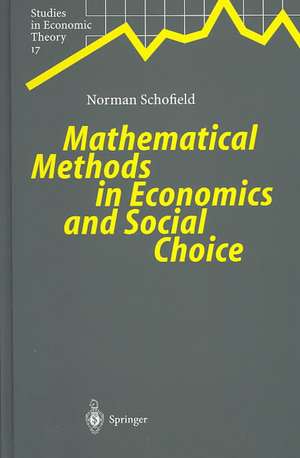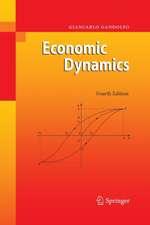Mathematical Methods in Economics and Social Choice: Studies in Economic Theory, cartea 17
Autor Norman Schofielden Limba Engleză Hardback – 12 feb 2003
| Toate formatele și edițiile | Preț | Express |
|---|---|---|
| Paperback (1) | 358.79 lei 38-44 zile | |
| Springer Berlin, Heidelberg – 17 sep 2016 | 358.79 lei 38-44 zile | |
| Hardback (2) | 372.11 lei 38-44 zile | |
| Springer Berlin, Heidelberg – 23 oct 2013 | 372.11 lei 38-44 zile | |
| Springer Berlin, Heidelberg – 12 feb 2003 | 394.51 lei 6-8 săpt. |
Din seria Studies in Economic Theory
- 18%
 Preț: 958.07 lei
Preț: 958.07 lei -
 Preț: 394.71 lei
Preț: 394.71 lei - 18%
 Preț: 952.57 lei
Preț: 952.57 lei -
 Preț: 383.93 lei
Preț: 383.93 lei - 15%
 Preț: 640.37 lei
Preț: 640.37 lei - 15%
 Preț: 645.28 lei
Preț: 645.28 lei -
 Preț: 386.39 lei
Preț: 386.39 lei - 18%
 Preț: 1247.26 lei
Preț: 1247.26 lei - 18%
 Preț: 1241.10 lei
Preț: 1241.10 lei - 15%
 Preț: 643.99 lei
Preț: 643.99 lei - 15%
 Preț: 644.49 lei
Preț: 644.49 lei - 15%
 Preț: 643.34 lei
Preț: 643.34 lei - 15%
 Preț: 640.88 lei
Preț: 640.88 lei - 15%
 Preț: 644.82 lei
Preț: 644.82 lei - 15%
 Preț: 645.79 lei
Preț: 645.79 lei - 18%
 Preț: 955.40 lei
Preț: 955.40 lei - 15%
 Preț: 643.00 lei
Preț: 643.00 lei - 18%
 Preț: 950.96 lei
Preț: 950.96 lei - 15%
 Preț: 636.30 lei
Preț: 636.30 lei - 18%
 Preț: 1022.48 lei
Preț: 1022.48 lei - 15%
 Preț: 648.05 lei
Preț: 648.05 lei - 15%
 Preț: 641.20 lei
Preț: 641.20 lei - 15%
 Preț: 652.64 lei
Preț: 652.64 lei -
 Preț: 402.17 lei
Preț: 402.17 lei - 18%
 Preț: 954.62 lei
Preț: 954.62 lei - 15%
 Preț: 639.41 lei
Preț: 639.41 lei - 18%
 Preț: 963.15 lei
Preț: 963.15 lei
Preț: 394.51 lei
Nou
Puncte Express: 592
Preț estimativ în valută:
75.51€ • 82.05$ • 63.47£
75.51€ • 82.05$ • 63.47£
Carte tipărită la comandă
Livrare economică 21 aprilie-05 mai
Preluare comenzi: 021 569.72.76
Specificații
ISBN-13: 9783540000860
ISBN-10: 3540000860
Pagini: 316
Ilustrații: XI, 300 p.
Dimensiuni: 155 x 235 x 23 mm
Greutate: 0.57 kg
Ediția:2003
Editura: Springer Berlin, Heidelberg
Colecția Springer
Seria Studies in Economic Theory
Locul publicării:Berlin, Heidelberg, Germany
ISBN-10: 3540000860
Pagini: 316
Ilustrații: XI, 300 p.
Dimensiuni: 155 x 235 x 23 mm
Greutate: 0.57 kg
Ediția:2003
Editura: Springer Berlin, Heidelberg
Colecția Springer
Seria Studies in Economic Theory
Locul publicării:Berlin, Heidelberg, Germany
Public țintă
ResearchCuprins
1: Sets, Relations and Preferences.- 1.1 Elements of Set Theory.- 1.2 Relations, Functions and Operations.- 1.3 Groups and Morphisms.- 1.4 Preferences and Choices.- 1.5 Social Choice and Arrow’s Impossibility Theorem.- 2: Linear Spaces and Transformations.- 2.1 Vector Spaces.- 2.2 Linear Transformations.- 2.3 Canonical Representation.- 2.4 Geometric Interpretation of a Linear Transformation.- 3: Topology and Convex Optimisation.- 3.1 A Topological Space.- 3.2 Continuity.- 3.3 Compactness.- 3.4 Convexity.- 3.5 Optimization in Convex Sets.- 3.6 Kuhn-Tucker Theorem.- 3.7 Choice on Compact Sets.- 3.8 Political and Economic Choice.- 3.9 References.- 4: Differential Calculus and Smooth Optimisation.- 4.1 Differential of a function.- 4.2 Cr-Differentiable Functions.- 4.3 Constrained Optimization.- 4.4 The Pareto Set and Price Equilibria.- 4.5 References.- 5: Singularity Theory and General Equilibria.- 5.1 Singularity Theory.- 5.2 Transversality.- 5.3 Generic Existence of Regular Economies.- 5.4 Economic Adjustment and Excess Demand.- 5.5 Structural Stability of a Vector Field.- 5.6 Speculations on Chaos.- 5.7 References.- Review Exercises.- Name Index.
Caracteristici
Will help make the concepts underlying mathematical economics, general equilibrium theory, and social choice theory more accessible. Includes supplementary material: sn.pub/extras
Textul de pe ultima copertă
In recent years, the usual optimization techniques, which have proved so useful in microeconomic theory, have been extended to incorporate more powerful topological and differential methods, and these methods have led to new results on the qualitative behavior of general economic and political systems. These developments have necessarily resulted in an increase in the degree of formalism in the publications in the academic journals. This formalism can often deter graduate students. The progression of ideas presented in this book will familiarize the student with the geometric concepts underlying these topological methods, and, as a result, make mathematical economics, general equilibrium theory, and social choice theory more accessible.













